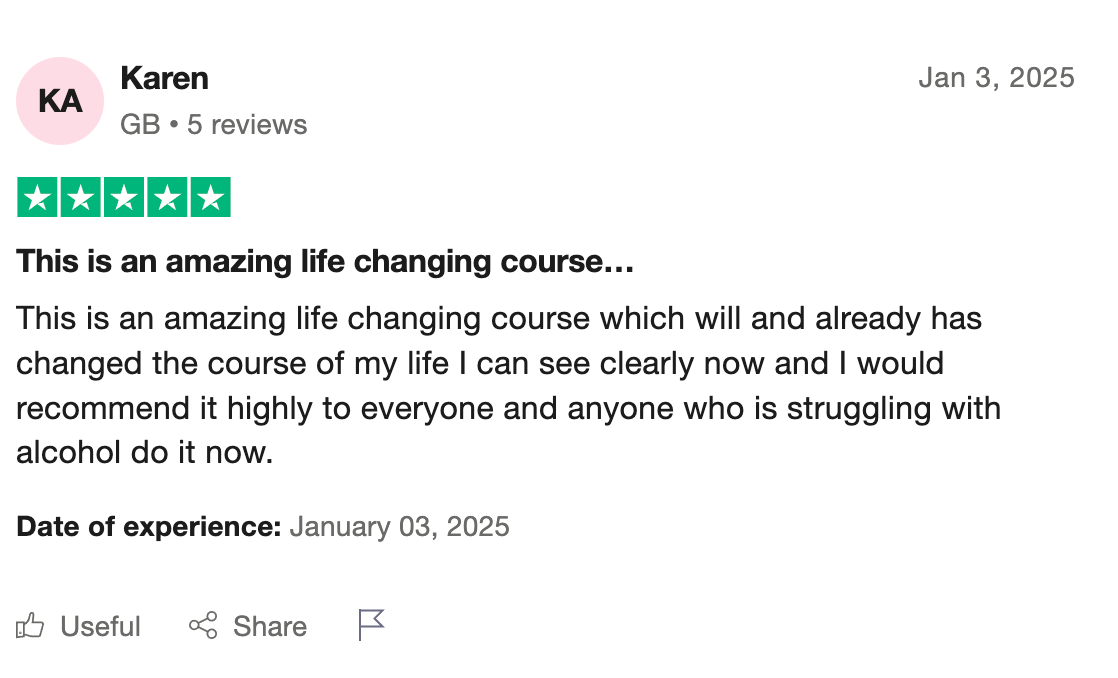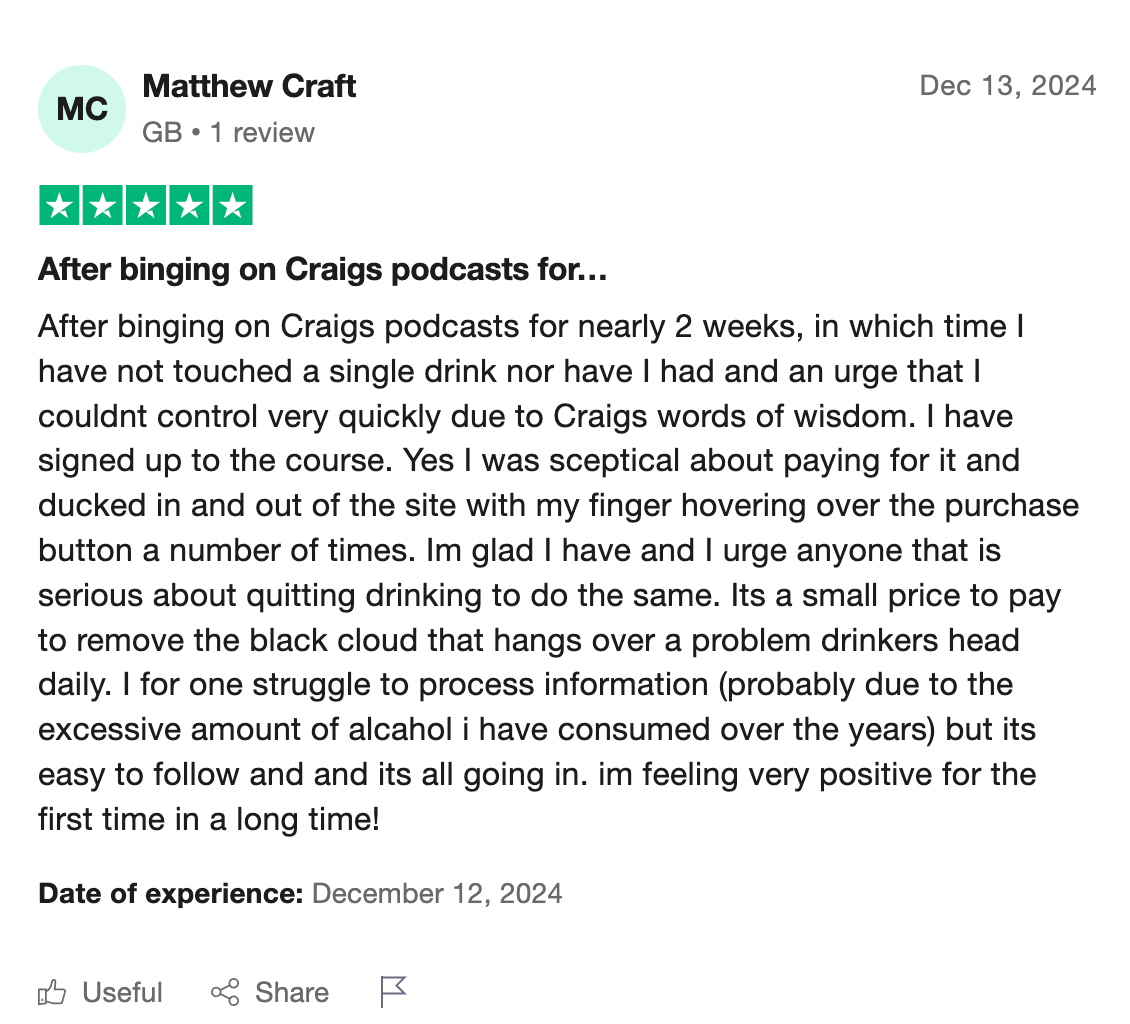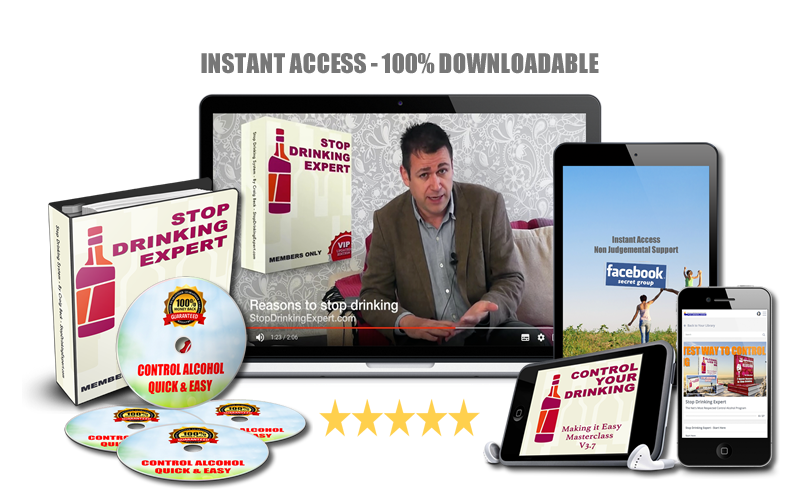How the Fear of Failure Can Stop You Getting Sober
Picture this. You lie in bed promising, yet again, that you will dump the booze tomorrow. Morning arrives, resolve slips, and the bottle wins another round. Each stumble feeds an inner voice whispering that you simply are not capable. That corrosive fear of failure can feel heavier than the hangover. It does not have to keep you stuck. Download a free copy of Alcohol Lied To Me at StopDrinkingExpert.com and discover you already possess the tools to break free.
The Silent Weight of What If
Few emotions freeze action faster than the dread of falling flat on your face. Alcohol pushes that dread into overdrive because society frames sobriety as an all or nothing sprint. One slip and you are back to square one, or so the myth goes. That fantasy keeps millions locked in place as surely as chains. When you fear missing the mark more than losing your health you will stay loyal to the poison and call it comfort.
Consider footballer Alex who told himself he would quit after the season. Each time the coach dropped him for sluggish play he necked another pint to smother embarrassment. Alex was not greedy. He was terrified that he might quit for a week, relapse at the team barbecue, and endure the mocking chorus of “I told you so.” Sound familiar? You may dread the sideways glance from colleagues or the raised eyebrow of a partner more than the brutal headache that greets you daily.
Neuroscience lends weight to this fear. Studies show that alcohol hijacks the brain’s reward circuitry leaving the amygdala hyper-sensitive to social rejection. In plain English your threat detector is dialled up to eleven. Every imagined judgment flashes red. Understanding that mechanism helps you see the fear for what it is: a glitch in brain wiring created by booze, not a verdict on your character. Recognition cracks the first brick in the wall.
Perfectionism and the Pint
Perfectionism dresses itself in designer clothing yet it usually smells of stale beer. If your rulebook reads “I must quit flawlessly first try or I am a lost cause” then you have stacked the game against yourself. Perfectionism sucks the colour from life and replaces it with rigid grayscale. Slip? The whole painting is ruined. Paradoxically accepting the possibility of a wobble makes long-term sobriety more likely because it lowers pressure and invites experimentation.
Imagine learning to ride a bicycle while insisting on zero wobbles. You would never push off. Recovery follows the same physics. Balance emerges through movement, not through pondering on the curb. The Stop Drinking Expert approach encourages manageable experiments. Try an alcohol-free evening then review. Take note of fresh energy next morning. Those small wins snowball into confidence, and confidence bulldozes fear.
Perfectionism drips into language. Perhaps you say “I should be stronger” or “I must show willpower.” Swap those judgemental verbs for softer ones like could and choose. Language tweaks mindset. When you drink less rather than quit forever you trip the brain’s curiosity switch. Curiosity outruns fear because it hunts reward not punishment. That linguistic pivot helped reader Maria clock sixty sober days after decades of nightly wine.
The Echo of Past Attempts
Maybe you have tried quitting five times or fifty. Each effort that fizzled leaves an echo whispering you will never manage. The echo sounds authoritative because it quotes lived experience. Yet past attempts failed under different conditions with less insight and weaker tools. They do not dictate tomorrow. Olympic runners fall in training. They tweak strategy then sprint again. You can treat every previous relapse as high-value data, not damning evidence.
Keep a candid journal that logs mood, triggers, and support gaps surrounding each lapse. Patterns emerge. You may notice Monday stress or loneliness on Sundays. With data in hand you craft fresh tactics. For instance enrol in an evening yoga class on Mondays. Replace Sunday gloom with brunch alongside sober friends. If loneliness bites explore our guide to drinking to help with loneliness and try the remedies suggested. Gathering intel transforms fear into strategy.
Psychologists call this self-efficacy—the belief that your actions produce results. Self-efficacy thrives when you reframe setbacks as assignments not verdicts. Thomas Edison needed thousands of prototypes before the lightbulb glowed. He smiled and said he had not failed, he had discovered ways that did not work. That sunnier outlook does not erase discomfort. It simply refuses to grant it permanent residence.
Social Scripts and Liquid Courage
Your mates may insist that a night out without a pint equals heresy. Culture pumps the same story. Adverts wrap alcohol in glittering confidence and romance. So you fear you will bomb at parties when you arrive glass in hand yet filled with sparkling water. That narrative sets failure as inevitable before you even start. Rip it up and write your own script.
Try advance planning. Before attending an event picture yourself ordering a zero proof drink with a relaxed grin. Visualisation primes the brain’s motor cortex making the action feel familiar when the moment arrives. Recruit an ally—one friend who agrees to remain alcohol-free beside you. Buddy systems slash anxiety and keep conversation lively after others slur. Check our playful piece on the afraid to stop drinking myth for more party hacks.
A surprising bonus often appears. People remember the witty sober guest the next morning while the blurred drinkers nurse regret. Your stock rises. Fear shrinks. Realise also that society is shifting. Craft alcohol-free beers now fill supermarket aisles. Bartenders flaunt colourful mocktail menus. You are not swimming alone against the tide any more.
The Illusion of Terminal Uniqueness
Plenty drinkers believe their situation is uniquely hopeless. You might think your stress level, genetic baggage, or family drama dwarfs everyone else’s and therefore the standard playbook cannot help. That belief sets up a self-fulfilling prophecy because it blocks you from seeking guidance. The Stop Drinking Expert community demolishes that notion daily as members swap almost identical war stories from wildly different backgrounds.
Sarah from London thought her corporate pressure cooker exempted her from recovery. Jorge in Austin blamed Latin party culture. Mei in Singapore feared bringing shame on her parents. Each assumed uniqueness yet each now celebrates sober anniversaries after embracing shared tools. Connection proves your problems are specific but not special. Once uniqueness melts, collective wisdom powers you forward faster than solitary willpower ever could.
Jump inside our private forum and witness stories that mirror yours. Laughter, tears, memes, and the occasional typo flow through the threads. That vibrant mosaic removes isolation, and isolation is the fertilizer for fear. Lean in, trade tips, cheer victories. Courage is contagious.
Making Failure Your Teacher
Ironically when you befriend the possibility of failure it loosens its chokehold. Athletes practise deliberate risk by training at the edge of ability. Musicians butcher new pieces before concerts. Pilots log hours in simulators crashing virtual planes to sharpen reflexes. Adopt that mindset. Schedule mini challenges. Maybe dine out without drinking on Friday or tackle the office happy hour armed only with sparkling water. Record what worked, what felt wobbly, and adjust.
Graduate to tougher missions. A wedding. A long-haul flight. Each triumph rewires neural pathways, proving to your threat detector that sobriety does not equal humiliation. Over time the fear circuitry quiets like a barking dog realising no burglar lurks outside. You move from white knuckle endurance to genuine peace.
Remember too that setbacks do not erase progress. If you stumble, pause, breathe, and restart the clock. Mercy is not the enemy of discipline. The American writer Mark Twain quipped that giving up smoking was easy because he had done it hundreds of times. The humour lands because it rings true. The final quit arrives on the back of many rehearsals.
Step Off the Hamster Wheel Today
By now you see fear of failure for what it is: a cunning illusion amplified by alcohol and cultural noise. Action punctures illusion. Download Alcohol Lied To Me free of charge right now and follow the evidence-based roadmap inside. You will learn why willpower alone feels exhausting and how painless mindset shifts make sobriety stick. Thousands have walked that path. Their success does not guarantee yours, yet it proves success sits within reach.
Every dawn hands you a blank page. You can scribble the same old plot or sketch a fresh adventure rich with energy, clarity, and genuine connection. Make the courageous choice even if knees shake. As the Japanese proverb reminds, fall seven times stand up eight. Your eighth rise could begin this minute. Click, download, and step into the bright calm beyond the bottle.
References
- Bandura A. Self-efficacy toward a unifying theory of behavioral change. Psychological Review. 1977.
- Volkow N, Koob G, McLellan A. Neurobiologic advances from the brain disease model of addiction. New England Journal of Medicine. 2016.
- Sinha R. Chronic stress, drug use, and vulnerability to addiction. Annals of the New York Academy of Sciences. 2008.
- Koob G, Le Moal M. Plasticity of reward neurocircuitry and the dark side of drug addiction. Nature Neuroscience. 2005.
Explore More on the Blog
- Why You Might Be a Problem Drinker
- Alcohol and High Blood Pressure
- How to Stop Drinking on Your Own
- Staying Sober on Vacation
- Afraid to Quit Drinking
Does this sound familiar?
- Drinking to escape stress and to cope with the pressures of life?
- Waking up full of guilt and regret that you drank again last night despite promising that you wouldn't?
- Hiding alcohol or the evidence of your drinking?
- Feeling like you are living a double life because of your drinking?
- Creating silly rules to try and control your drinking (e.g., I will only drink on special occasions)?
The good news is that you are not alone; the better news is that I can help.
Meet Craig Beck, The World's Most Respected Sobriety Coach
Craig Beck, better known as “The Stop Drinking Expert”, turned a 20-year battle with alcohol into a roadmap for lasting freedom. The bestselling author of Alcohol Lied to Me and The Sobriety Secret discovered that traditional routes like Alcoholics Anonymous can feel embarrassing, public, and all too often, entirely ineffective.
His method is different. It shows you:
- Why you drink in the first place—the hidden brain loops alcohol hijacks.
- How to switch off cravings before they even start.
- A willpower-free exit plan you can follow privately, at your own pace—no labels, no awkward meetings, no medication.
Hundreds of thousands worldwide now wake up clear-headed, proud and at peace thanks to Craig’s approach. Will you be the next?
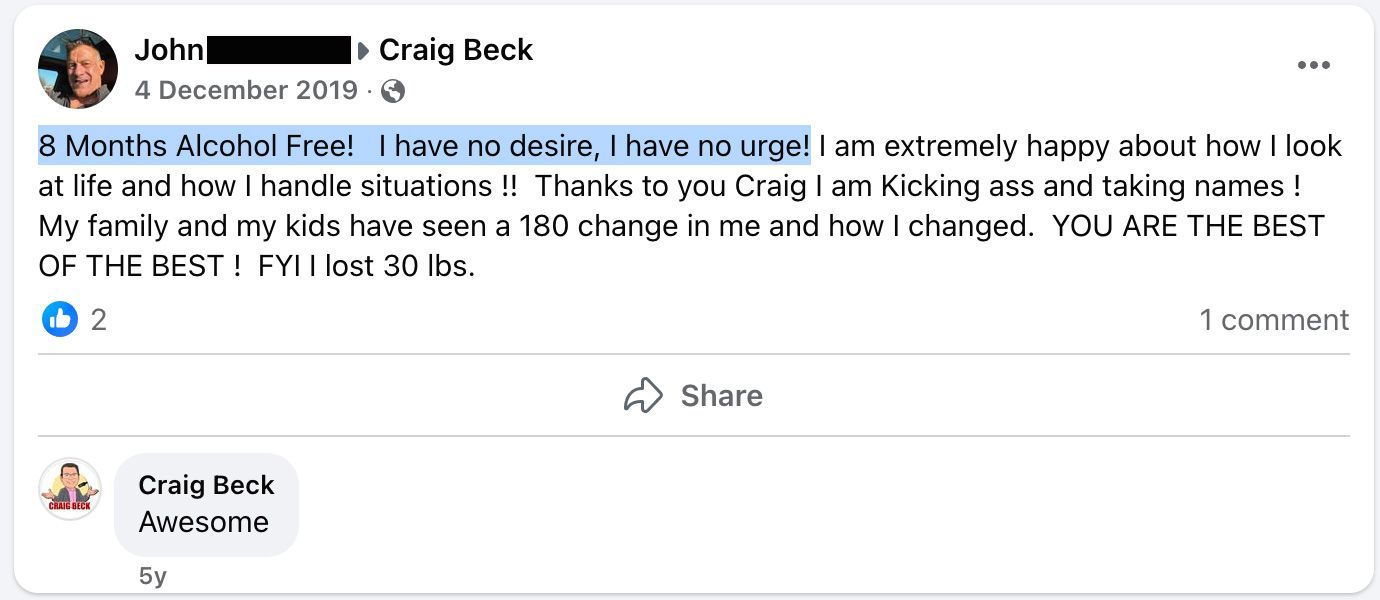
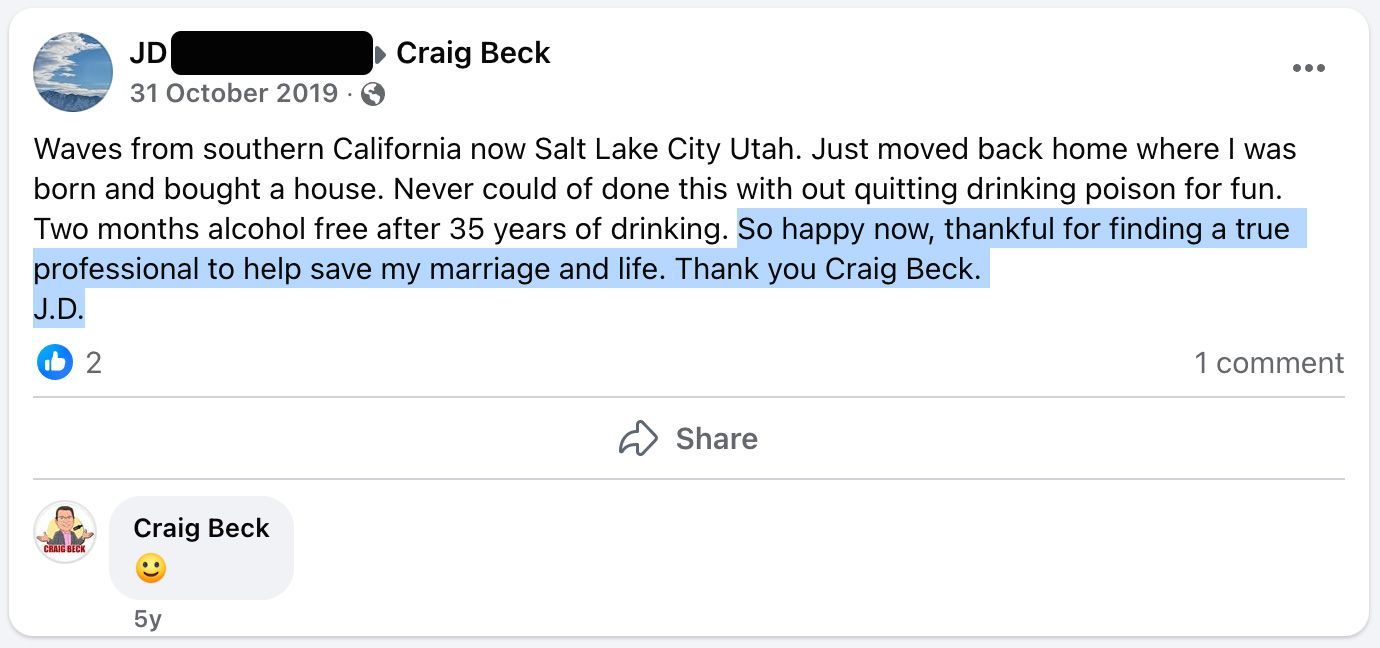
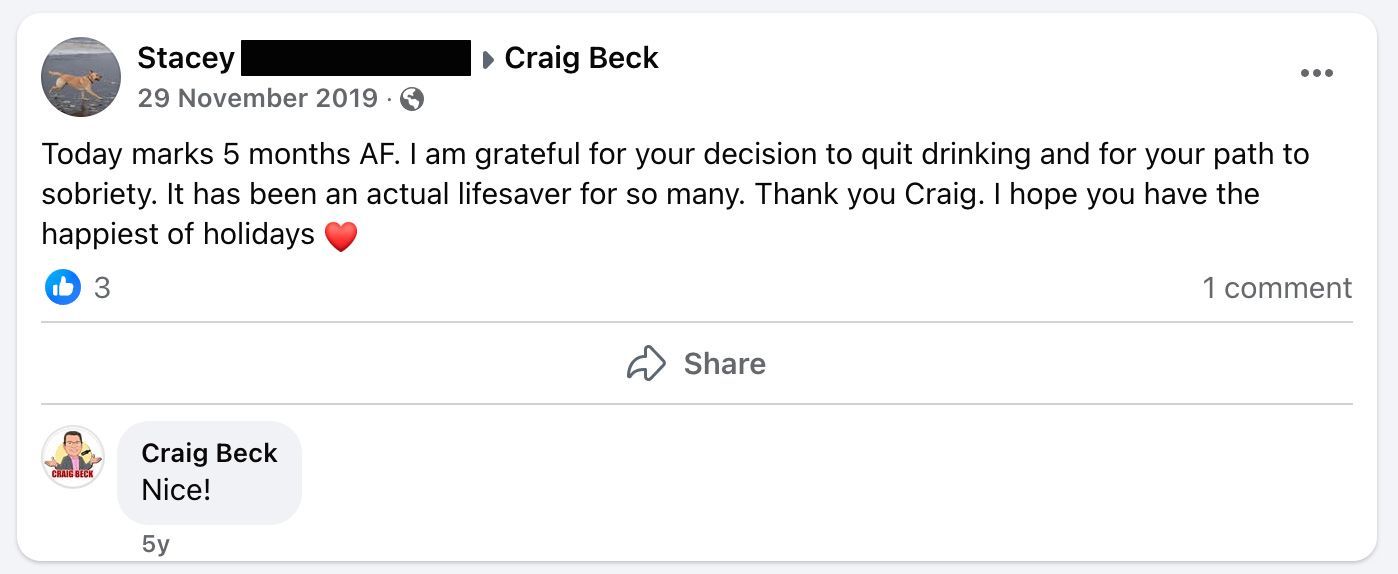
"Effortless Sobriety: The Proven Path to End Problem Drinking"
No one likes asking for help with their drinking—it feels personal and heavy. But if willpower alone hasn’t worked, it’s not because you’re weak. Research indicates that relying solely on grit is unsuccessful approximately 95 percent of the time. You’ve simply been using the wrong tool for the job.
Download my free ebook or decide now get started with the full course and learn:
- Why the game is rigged: how alcohol rewires your brain chemistry and makes “just trying harder” almost impossible.
- A science-based exit plan: practical steps that work quickly, privately, and on your terms.
- No awkward meetings or risky meds: forget the gimmicks—this is about smart strategy, not shame.
`Are you ready to step onto solid ground? Get off the fence, take action, and start taking back control—quickly, confidently, and without the struggle.
Over 250,000 Happy Sober Clients Can't Be Wrong:






